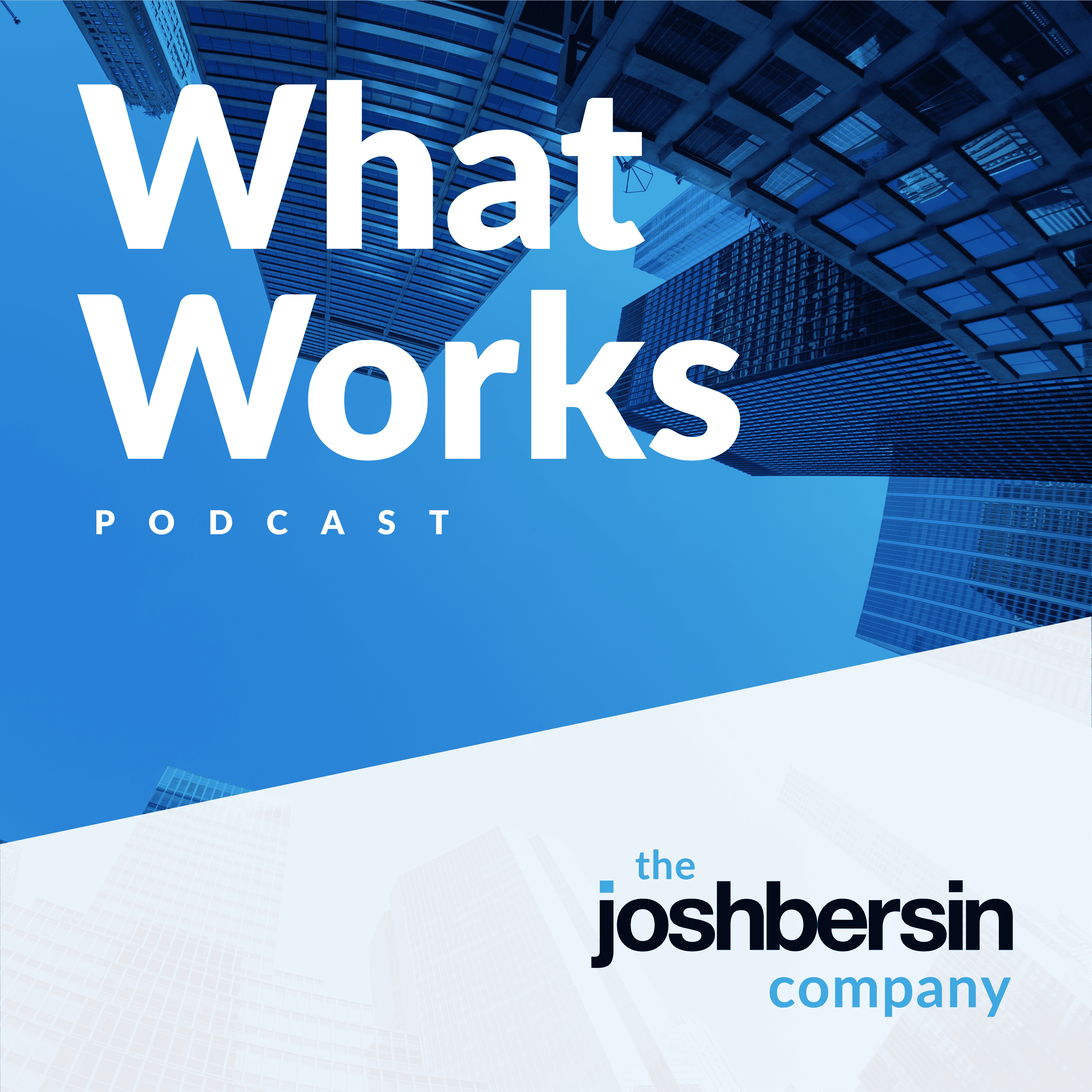Episode Transcript
Speaker 1 00:00:07 Hi guys today. I want to talk about the HR tech market a little bit, because we're coming up on the big HR technology conference in September. I'm preparing my keynote and, uh, a lot of things have been happening in advance of that. And the title of this podcast is quote, the HR tech market can be brutal because it, it can be. And here's why this is one of the largest technology markets in industry. Every organization's every company of all size needs, HR technology, payroll, employee record, keeping training, onboarding benefits, et cetera. And so for those of you that are entrepreneurs or investors, it always looks like a massive, totally addressed total addressable market or called Tam. The problem of course, is that it's very, very competitive. It is one of the biggest, what is called red oceans in the tech industry. And so what HR technology vendors do is they try to innovate.
Speaker 1 00:01:06 They try to come up with something new, something different, something unique, and they think, or they believe that because they've reinvented the wheel, that all sorts of companies are going to buy their product, but then they suddenly find out that good ideas are easy to copy. And there's all sorts of adjacent vendors selling into the space that are confusing. The buyers from finding the thing that they invented. And so it takes patients, it takes focus, it takes marketing, it takes sales and HR technology vendors have to pick the space. They wanna do business in as most of you know, because there's so many pieces of HR technology needed customers buy different things at different rates of speed. Some companies are very innovative and very creative and they will buy new tools all the time. Some companies wait and they're laggards and they hold onto technology for years and they never wanna replace it.
Speaker 1 00:02:03 And some companies just don't have a lot of respect for technology and they oftentimes just don't even bother with it until somebody tells 'em they absolutely need it. And of course, small companies have different needs from big companies, companies in healthcare or retail or financial services or pharma or manufacturing all have completely different kinds of workforces and they have different needs. So it's actually not one big market. It's a whole bunch of segments of the market, each of which are potentially huge to a vendor. Now, let me talk about why this market is so brutal and I'm gonna give you, you know, some specific examples. I have the opportunity to talk to many, many of the most creative, innovative HR technology vendors in the world. And to a hundred percent, they're all run by very creative, very innovative, very hard working people. And many of them have deep pockets from fairly sophisticated investors.
Speaker 1 00:03:03 I am not as high on investors as I am on entrepreneurs. Some of the investors are quite savvy, but you know, a lot of money gets thrown around just because the market is big. And so there's lots of times that the investors are not sure exactly what they're getting into while the entrepreneurs generally are over the last, you know, really 60 to 90 to 120 days. I wanna point out two lists of companies that have been acquired to give you a sense of deals that kind of didn't work out as well as companies wanted in deals that did work out even better than companies wanted. And the recruiting side two deals just were announced this week in Tello was acquired in biometrics. TRICS was one of the pioneers of AI based assessment. It was an incredible idea and a great technology. The company grew got some pretty big clients, but reached a stage of growth where they couldn't build out enough additional components in the system to make it a total end end solution.
Speaker 1 00:04:04 So they were acquired and Tello, very similar technology for sourcing great idea, very early stage in the areas of AI and data driven sourcing the company grew in its early days. The CEOs down there in there for quite a long time, they were acquired this week too. A third company. That's an example of one that was sort of brutally tossed around is a company called high ground. The founder of high ground was a very, very creative entrepreneur who built a next generation performance management system. And it was really a state of the art system. It had goals and feedback and checkins and development planning, and a very, very creative mobile interface, but he didn't realize how difficult it was gonna be to sell and to go to market and to really build the marketing organization that he needed. So that company was acquired by a vendor now called Kazu in praise, another one in the performance management market, great team, great user experience, great technology was acquired by our better up recently, they also found the market was a little too competitive for them.
Speaker 1 00:05:09 Tiny pulse. I remember at our impact conference before Deloitte or right in the early days of my experience at Deloitte, the CEO of tiny pulse was this incredibly smart technology guy. And he really believed that pulse surveys were going to take over the whole world of employee feedback. And he was right, of course. And at the time, you know, there were a couple of companies like waggle and a few others that were kind of nibbling around this space. He launched that company. It was very, very successful mid-size companies. They did not survive. They were acquired by Limeade. And I think that was mostly a go to market challenge for them. Some total, most of you know, that sum total was the sum total of a whole bunch of other companies click to learn docent, a couple of performance management companies, a whole bunch of other things.
Speaker 1 00:05:54 They kept getting more money and more money and more money and trying harder and harder and harder to build the end to end learning platform, but could not compete with plateau, which was eventually acquired by success factors, SBA, which was just a very successful company in its early days and cornerstone. And it now was acquired eventually by Skillsoft and then sold by Skillsoft back to cornerstone as a really a cash machine. As part of the cornerstone acquisition learning industry is filled with all sorts of examples of, of vendors that had challenges. SBA itself is a fascinating story. I know Bobby Yaz, Donny, the founder, and when I was a digital think many years ago, we emulated SBA to be the model of a software company. We wanted to be SVA was the first E R P for corporate training way ahead of its time. But of course the market moved companies get into talent management, performance management, goal setting development, planning, and SVA tried to build most of that out.
Speaker 1 00:06:50 But the system turned out to be a great system for large complex organizations, but never really became easy to use for small companies. And eventually SBA merged with several other companies and was later acquired by cornerstone, which was a really interesting deal because cornerstone was really the startup that was challenging SBA, by the way, on the topic of cornerstone, there's lots of lessons to be learned by cornerstone Adam Miller, who was the founder, one of the founders and the CEO of cornerstone was one of the most successful entrepreneurs I've ever met in the HR tech space because he understood product. He understood market understood sales understood marketing. And what cornerstone has done for years is very successfully find a way to grow and compete in this red ocean by continuously evolving its product, its technology and its story. And, and I can't overestimate enough the importance of the story you as an entrepreneur, if you're a vendor, have to know how to talk about what you're doing in a way that compels the interest of the HR buyer or the it buyer.
Speaker 1 00:07:58 And that's one of the things cornerstone has done for many, many years and continues to serve them. Well, another big deal that I thought was really illustrative of the, of the problem is Zs Zenefits, I think got close to a billion dollars of, of investment. It was a lot of money, many hundreds of millions of dollars tried to build a next generation HR system. It was originally intended to be free and they were gonna make money as a, as a benefits broker. There were all sorts of ethical problems in that company, all sorts of technology problems. They did become a very highly valued company. They were sold finally at the end of all of this to TriNet for essentially zero. And the reason that I know in fact, TriNet may have gotten money from them. I don't know how it actually worked, but the reason I know that they were sold for eventually zero is that one of my friends is an employee at benefits.
Speaker 1 00:08:46 And she told me that her stock options eventually resulted in nothing. So I think the management team walked away with some money and nobody made anything else. So there's an example of one, uh, that didn't work out. Lever is another one. Lever was founded by some very creative entrepreneurs in the recruiting space. They had no idea how complicated it was gonna be. I told them when I met with them, it was gonna be a challenge. And they of course found that it was, and applicant tracking systems are a commodity. There's a lot of them. And if you're not selling to small, medium sized businesses, it's a very, very, very complex application. They're acquired the companies, waggle and culture IQ were both incredibly interesting creative vendors and technologies in the listening space, both were acquired by septics septics is now becoming one of the leaders in employee listening.
Speaker 1 00:09:33 I'll talk about pecan in a minute. IBM acquired Kenexa. Kenexa was a company that tried to build all sorts of technology and recruiting. It was a very successful company. It became a multi-billion dollar market cap company. The founder of Xa decided to move on with his life and Kenexa was acquired by IBM and over the next maybe six, seven years. IBM realized that all of the technologies that connection had built were very difficult to sell because of the competition. And IBM really isn't a product sales organization. It's so much more of a consulting organization. And so they ended up selling off. Most of it, virtually all of it now. So those are stories of HR tech vendors that were very cool, exciting, interesting technologies. They grew, they were darlings at their time and they eventually didn't quite fulfill their promise. The investors probably didn't get their returns or any returns at all, and they were acquired, but sometimes it goes the other way.
Speaker 1 00:10:30 Sometimes it works really well. So let me talk a little bit about those ed cast, ed EdCast and degreed were battling it out in the market, trying to figure out how to go after the LX P space degreed, of course, is still a viable, successful company continues to be out there. A lot of you have degreed. EdCast was a fast follower, really kind of jumped ahead of degreed in many of its technologies, very aggressive sales and marketing, Carl MEA as a really amazing business person and was sold eventually to cornerstone for a very large number. And that's an example of success code academy, a really creative, innovative learning company was acquired by skill Skillsoft for a very large number. That's a great story. Pecon when I first saw pecan, I thought, you know, why does the world need one more engagement survey? But the user experience, the architecture, the design, the use cases that they developed over there were really unique and really special.
Speaker 1 00:11:30 They are now a part of Workday and they're gonna be pioneering a lot of the in fact, they're one of the most exciting parts of Workday. If you listen to the analyst presentations. So that was a very successful HR tech company Qualtrics. I remember using Qualtrics when it was a small company as an analyst firm, we were one of their early customers when we were just using them for surveys that has obviously become a massively successful company. They were acquired by SAP. They spun off and went public. And now they're, you know, a multi-billion dollar public company. TMY UY is an interesting story. I think the valuation of TMY is going to skyrocket over the next couple years. This is a company that has literally built an entirely new model for corporate training, bringing together experts and instructors and thought leaders to build courses for corporations and building an incredible platform for that interesting story on you.
Speaker 1 00:12:21 To me, UT me was privately valued at 50 to $60 a share when they went public, they happened to go public at a bad time. The stock price drop down to something like $15 a share that company's gonna be a growth company in the future. And you'll see if you look at what they do, why they're so different in the learning space. LinkedIn obviously was a very successful company that was acquired by Microsoft. A lot of people made a lot of money there. Clint Clint was a really fascinating company when I first met Jim Barnett and the team Atlin again, I scratched my head and said, well, you know, you guys, um, big fans, but very crowded space for employee surveys. Well, sure enough, they reinvented it. They came up with better analytics, cross domain surveys, a better model for performance management. They were eventually acquired by Microsoft by LinkedIn first, they're now part of Microsoft Viva.
Speaker 1 00:13:10 So that was a big success. linda.com. If any of you remember that company, self authored and really high quality professional video training for software developers and designers became a billion dollar acquisition by LinkedIn and is now a multi-billion dollar business by LinkedIn. Again, very strong focus on customers. They didn't try to do everything. They were exceptionally good at the content they built for the audience they were going after focus works. And by the way, you know, one of the stories about focus in HR is even though you may have a narrow focus for your product, the market is so big that if you become the dominant player in the niche that you create, you can become a very successful company. So, so my story here is not to uncover the dirty laundry of any vendors, but simply to get you to think about the fact that if you're an investor or a vendor, you have to focus, you have to decide what part of the market you're going after.
Speaker 1 00:14:09 You have to invest in sales and marketing, and you have to stick with it because this is going to be a crowded market for the rest of our lives. And it will always be very dynamic. And if you're a buyer, if you're an HR technology architect or an HR leader, and you're talking to all of these vendors, try to get to know the management teams, ask them who they believe their target market is and why you as a customer are in their target market. Look for references like your company that are similar to your company to make sure you are in their sweet spot and do a little due diligence on the management team and get a sense of whether you think they have the staying power. I continue to believe that the HR technology market is one of the most innovative, creative and important parts of business, new tools like Microsoft Viva service.
Speaker 1 00:14:59 Now, Workday, Oracle HCM, cloud success factors. These are groundbreaking technologies, massive investments by these vendors, transforming companies all over the world to make the world better for employees and of course for citizens. And so it will always be a highly dynamic market, but it is brutal. And so I ask you to be forgiving of your vendors, forgiving of your executives, if you're an investor and stick with it. And if you stick with it as a provider, you will find your niche. And for those of you looking for HR technology, please come to the HR technology conference. I'll be talking a lot about it on Wednesday morning at my keynote. And we look forward to helping you make the right decisions for the right strategy for your company. Thank you.


